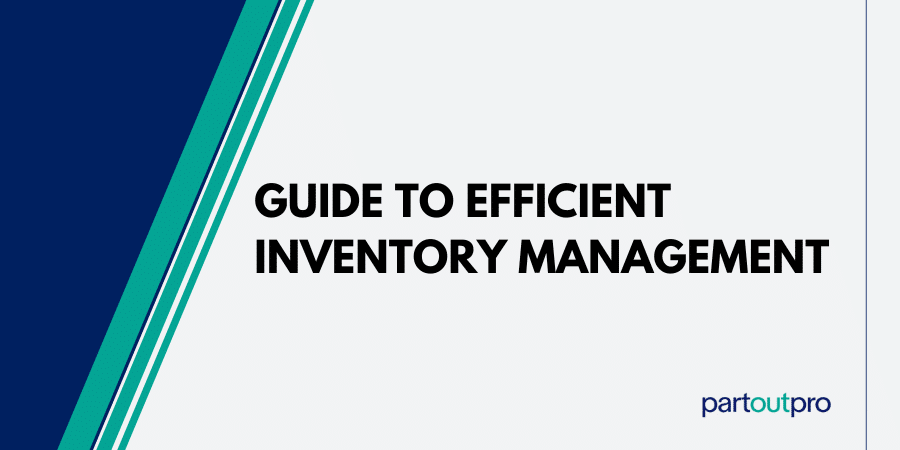Efficient inventory management is crucial for optimizing operations and maximizing profit potential for auto parts sellers on eBay, including recyclers, dismantlers, refurbishers, and automotive hobbyists. As the industry continues to grow and evolve, effective practices in inventory management can differentiate a thriving business from a struggling one. We’re here to provide you with comprehensive strategies to streamline your operations and enhance efficiency using the core services of an integrated parts catalog and listing solutions system tailored for auto parts sellers.
The Importance of Efficient Inventory Management
1. Maximizing Profitability
Better Cash Flow Management
Efficient inventory management ensures that you only purchase the stock you need, which means less money is tied up in unsold inventory. This improves cash flow, enabling you to invest in other areas of your business, such as marketing or new technologies.
Reduced Holding Costs
Storing unsold auto parts for extended periods can be costly. Efficient inventory management minimizes these holding costs by preventing overstock situations, thus saving on storage expenses.
2. Enhancing Customer Satisfaction
Meeting Customer Demand
By accurately forecasting demand and maintaining optimal inventory levels, you can ensure that you always have the products your customers are looking for. The integration of fitment data helps in verifying part compatibility, ensuring that the parts fit the customer’s vehicle, leading to higher satisfaction and fewer returns.
Reducing Fulfillment Times
Efficiently managed inventory means quicker picking, packing, and shipping times. Faster fulfillment not only delights customers but also enhances your reputation as a reliable seller. Fitment data further streamlines the process by reducing the time spent verifying part compatibility, allowing for more efficient order processing.
3. Streamlining Operations
Improved Accuracy
With accurate inventory tracking and comprehensive fitment data, you reduce the risks of errors such as overstock, understock, or misplaced items. Reliable records ensure you know exactly what you have in stock, which parts need replenishing, and where each part is located, as well as which vehicles they are compatible with.
Easy Audits and Reporting
Efficient inventory management systems simplify audits and generate comprehensive reports. This enables you to comply easily with any regulatory requirements and helps you make informed business decisions based on accurate data. Fitment data inclusion ensures that your parts catalog reflects accurate compatibility, adding another layer of precision to your audits and reports.
4. Competitive Advantage
Better Pricing Strategies
With precise data on inventory levels and market trends, as well as detailed fitment information, you can set competitive prices that attract more customers while maintaining healthy profit margins. Pricing optimization tools can further aid in developing effective pricing strategies based on compatibility and demand.
Agile Adaptation
An efficient inventory management system that includes fitment data allows you to adapt quickly to market changes, whether it’s a new trend, a seasonal demand spike, or unforeseen disruptions. Being agile gives you a significant competitive edge, keeping your business relevant and resilient.
5. Sustainable Practices
Reduced Waste
For sellers dealing in recycled, salvaged, or pre-owned parts, efficient inventory management helps in reducing waste. By optimizing inventory levels, including verifying fitment data, you avoid scrapping unsold parts and contribute to environmentally friendly practices.
Enhanced Supplier Relationships
Efficient inventory management often involves establishing strong relationships with suppliers. Reliable suppliers can provide quality parts just when you need them, minimizing the need for excessive stockpiling and waste. Fitment data ensures that suppliers deliver parts with verifiable compatibility, reducing the risk of mismatched inventory
Understanding the Fundamentals of Inventory Management
Importance of Inventory Management
Inventory management is the backbone of any auto parts selling operation on eBay. Proper inventory management helps in tracking stock levels, predicting demand, preventing overstock or stockouts, and ensuring customer satisfaction. It is particularly important for sellers dealing with recycled or salvaged parts, as these items often have limited availability and unique identification requirements.
Core Inventory Management Principles
Efficient inventory management revolves around several core principles:
- Accuracy: Keeping precise records of inventory ensures you always know what you have, where it is, and how it is being utilized.
- Forecasting: Predicting future sales trends helps maintain optimal inventory levels.
- Efficiency: Streamlining operations to minimize waste and maximize productivity.
Leveraging Technology for Efficient Inventory Management
Integrated Parts Catalog
An integrated parts catalog is a powerful tool for auto parts sellers. It provides a comprehensive database of auto parts, ensuring that you have detailed and accurate information about each part.
Benefits:
- Simplifies inventory tracking
- Enhances accuracy in listings
- Supports efficient search and retrieval of parts
Listing Solutions System
A robust listing solutions system is essential for managing and automating your eBay listings.
Benefits:
- Saves time by automating repetitive tasks
- Reduces errors associated with manual entry
- Improves listing visibility and accuracy
Channel Integrations
Channel integrations enable you to synchronize your inventory across multiple platforms seamlessly.
Benefits:
- Ensures consistent inventory levels across sales channels
- Avoids overselling and stock discrepancies
- Streamlines order management and fulfillment
Pricing Optimization
Proper pricing strategies are crucial for maximizing profitability. Pricing optimization tools help you set competitive yet profitable prices.
Benefits:
- Analyzes market trends and competitor pricing
- Suggests optimal pricing strategies
- Increases sales while maintaining profit margins
Best Practices for Auto Parts Inventory Management
Accurate Inventory Tracking
Maintain an up-to-date inventory system to eliminate discrepancies and ensure real-time accuracy.
Tips:
- Regularly audit your inventory
- Use barcode scanners and RFID technology
- Keep track of receiving, storing, and shipping activities
Organizing and Categorizing Inventory
Proper organization is key to efficient inventory management.
Tips:
- Categorize parts based on type, condition (e.g., salvaged, pre-owned), and compatibility
- Use clear and consistent labeling
- Optimize storage layout to facilitate easy access and retrieval
Demand Forecasting
Anticipating demand helps maintain optimal inventory levels.
Tips:
- Analyze historical sales data
- Monitor industry trends and seasonal variations
- Use predictive analytics tools
Efficient Stock Replenishment
Implementing efficient stock replenishment methods ensures you never run out of stock or overstock.
Tips:
- Use automated reorder point systems
- Establish relationships with reliable suppliers
- Implement just-in-time (JIT) inventory practices
Implementing Inventory Management Software
Invest in inventory management software designed for auto parts sellers.
Benefits:
- Centralizes inventory data
- Automates inventory control processes
- Provides analytical insights for better decision-making
Enhancing Customer Satisfaction through Efficient Inventory Management
Reducing Order Fulfillment Time
Quick and accurate order fulfillment builds customer trust and satisfaction.
Tips:
- Streamline picking, packing, and shipping processes
- Use integrated inventory and order management systems
- Maintain sufficient stock levels of high-demand items
Ensuring Product Availability
Keeping an optimized inventory ensures that you meet customer demands promptly.
Tips:
- Regularly update eBay listings to reflect real-time stock levels
- Utilize inventory buffers for critical items
- Foster efficient returns and restocking procedures
Providing Accurate Product Information
Clear and detailed product descriptions help customers make informed purchasing decisions.
Tips:
- Use high-quality images and detailed descriptions
- Include part compatibility and condition (e.g., salvaged, pre-owned) information
- Regularly update listings to reflect any changes
Continuous Improvement and Adaptation
Analyzing Performance Metrics
Regularly review key performance indicators (KPIs) to assess the effectiveness of your inventory management.
Metrics to Monitor:
- Inventory turnover rate
- Order accuracy rate
- Stockout frequency
- Customer satisfaction scores
Staying Adaptable
The auto parts market is dynamic; staying adaptable helps you remain competitive.
Strategies:
- Stay updated with industry trends and technological advancements
- Be open to adopting new inventory management practices
- Continuously train your team on best practices and technology use
Customer Feedback
Listening to customer feedback can provide valuable insights for improving inventory management.
Tips:
- Conduct regular customer surveys
- Monitor customer reviews and ratings
- Act on feedback to enhance your processes
By implementing these strategies and leveraging the technology provided by an integrated parts catalog and listing solutions system, auto parts sellers on eBay can achieve efficient inventory management. This not only streamlines operations but also maximizes profitability and enhances customer satisfaction.
Conclusion
Efficient inventory management is a pivotal aspect of running a successful auto parts business on eBay. By understanding the fundamentals, leveraging technology, following best practices, and continuously adapting to market demands, sellers can optimize their operations and achieve sustained growth. Embrace the power of an integrated parts catalog, listing solutions, channel integrations, and pricing optimization to revolutionize your inventory management and boost your business performance.



